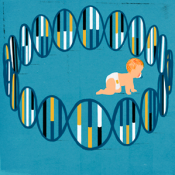Sequencing projects will screen 200,000 newborns for disease genes
By Jocelyn Kaiser,
Science
| 12. 12. 2022
The once-futuristic idea of sequencing every newborn child’s DNA to screen for genes that could shape their future health is being put to two major tests. The United Kingdom today announced plans to sequence the genomes of 100,000 newborns for about 200 rare genetic diseases starting next year. In New York City, a similar project already underway will screen for a slightly larger number of diseases in 100,000 babies from the city’s diverse population.
The goal is to catch treatable diseases that standard newborn screenings cannot detect. If sequencing delivers an early warning of a problem, the baby could receive care that averts permanent disability or even death.
But sequencing the full genomes of newborns raises a host of ethical questions, including who will get access to the data, and whether it will needlessly worry parents by revealing genes that may never cause serious illness. “We’re really cognizant of the complexity of the questions,” says Richard Scott, chief medical officer for Genomics England, the government-funded company running the U.K. project. At the same time, he says, “There’s a really...
Related Articles
By Arthur Lazarus, MedPage Today | 01.23.2026
A growing body of contemporary research and reporting exposes how old ideas can find new life when repurposed within modern systems of medicine, technology, and public policy. Over the last decade, several trends have converged:
- The rise of polygenic scoring...
By Stephanie Pappas, LiveScience | 01.15.2026
Genetic variants believed to cause blindness in nearly everyone who carries them actually lead to vision loss less than 30% of the time, new research finds.
The study challenges the concept of Mendelian diseases, or diseases and disorders attributed to...
By David Cox, Wired | 01.05.2026
As he addressed an audience of virologists from China, Australia, and Singapore at October’s Pandemic Research Alliance Symposium, Wei Zhao introduced an eye-catching idea.
The gene-editing technology Crispr is best known for delivering groundbreaking new therapies for rare diseases, tweaking...
By Josie Ensor, The Times | 12.09.2025
A fertility start-up that promises to screen embryos to give would-be parents their “best baby” has come under fire for a “misuse of science”.
Nucleus Genomics describes its mission as “IVF for genetic optimisation”, offering advanced embryo testing that allows...




